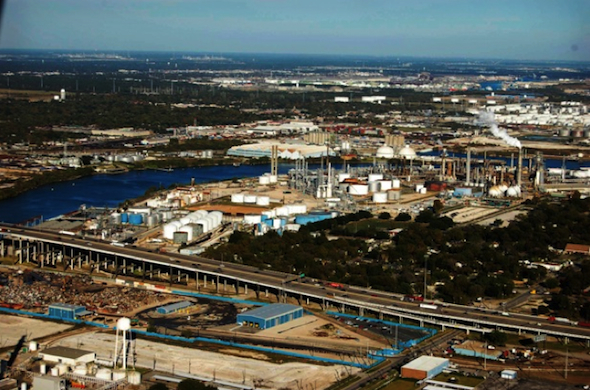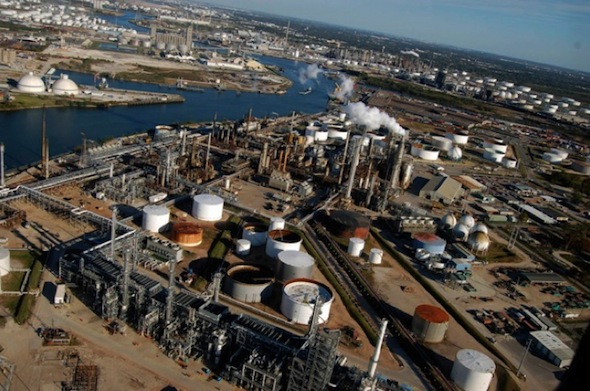How much can one community take?
 The Manchester neighborhood in Houston is completely surrounded by Valero, Texas Recycling, a car crushing facility, the Port of Houston, Highway 610, a rail yard and a waste water treatment plant. These are two aerial photos of the Manchester community that my dad, Juan Parras, took a few years ago. The area in green is of course Manchester. The third image is a shot of the Houston Ship Channel. You can see the extent of industry's concentration here in the "Petro-Metro."
The Manchester neighborhood in Houston is completely surrounded by Valero, Texas Recycling, a car crushing facility, the Port of Houston, Highway 610, a rail yard and a waste water treatment plant. These are two aerial photos of the Manchester community that my dad, Juan Parras, took a few years ago. The area in green is of course Manchester. The third image is a shot of the Houston Ship Channel. You can see the extent of industry's concentration here in the "Petro-Metro."
As if this isn't bad enough, another industrial pollution threat is looming, one that could stretch all the way across the middle of the United States. President Obama is deciding soon whether to approve a pipeline that would stretch from Canada to Houston.
TEJAS has done work over the last year in collaboration with the Sierra Club and others to bring attention to the Keystone XL pipeline. We do not support extraction of the Tarsands in Alberta, Canada, we do not support a cross-national pipeline and we certainly do not support it being refined in a community that is already inundated with industry. 

The other community that the pipeline is destined for is Port Arthur. Hilton Kelley, who recently won the Goldman Award for his environmental justice work, has unfortunately not come out against the pipeline. The community in Port Arthur is similarly overburdened with petrochemical plants and refineries but we have not been able to get support from him on this issue.
The petrochemical industry is green-washing the tarsands in Canada, calling it "Ethical Oil". Of course, we are all smarter than that. During my trip to London for the BP shareholder's meeting this spring, I had the good fortune of meeting some great people. Among them were indigenous leaders Clayton Thomas-Muller, Melina Massimo, and Jasmine Thomas. Clayton works with the Indigenous Environmental Network, Melina with Greenpeace and Jasmine with IEN I believe. Jasmine's mother was with a delegation of indigenous leaders from Canada that met with the United Houma Nation and Indigenous leaders from Ecuador after the BP Drilling Disaster. It was a powerful meeting. Perhaps, it's time to gather everyone once again. This pipeline, if approved, would be absolutely devastating to Manchester and Port Arthur, not to mention neighbors of the tarsands in Canada, and countless communities in between.

All photos by Juan Parras, TEJAS.
BRYAN PARRAS is the Media/Youth Empowerment Coordinator for TEJAS (Texas Environmental Justice Advocacy Services) in Houston Texas, a co-producer of “Nuestra Palabra: Latino Writers Having Their Say” (KPFT / Pacifica FM 90.1), and an advisor to the Gulf Coast Fund for Community Renewal and Ecological Health. He uses still photography and video production to document environmental racism and empower communities engaged in struggle for environmental justice. Formerly he served as director of photography/videography and chief editor for the Maria Luisa Ortiz Cooperative project in Mulukuku, Nicaragua.
